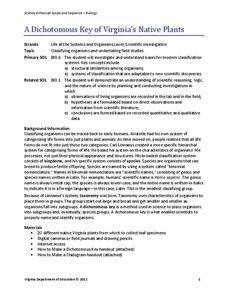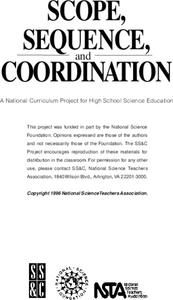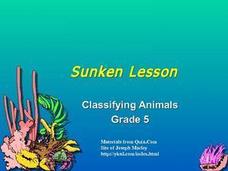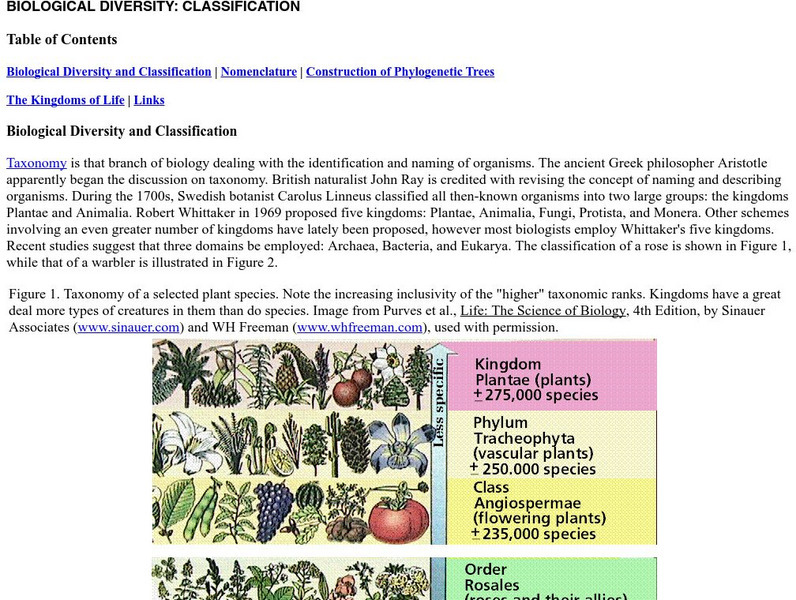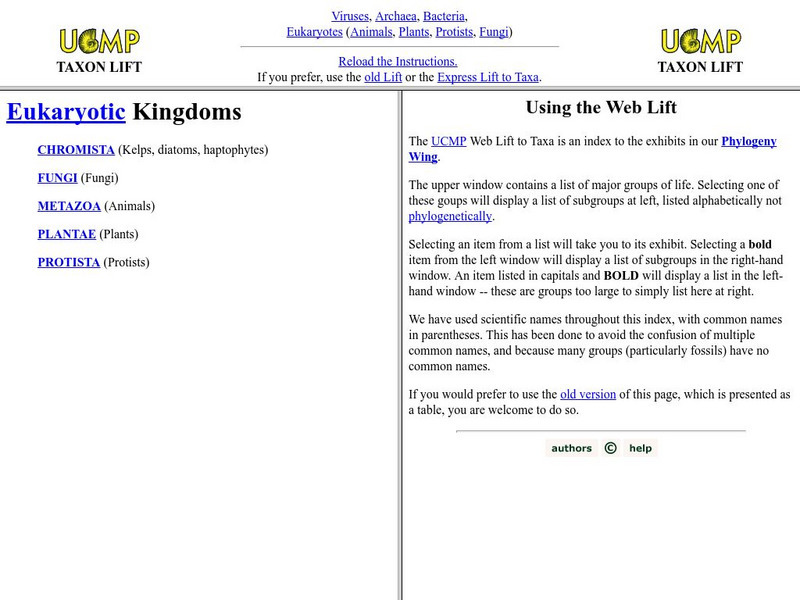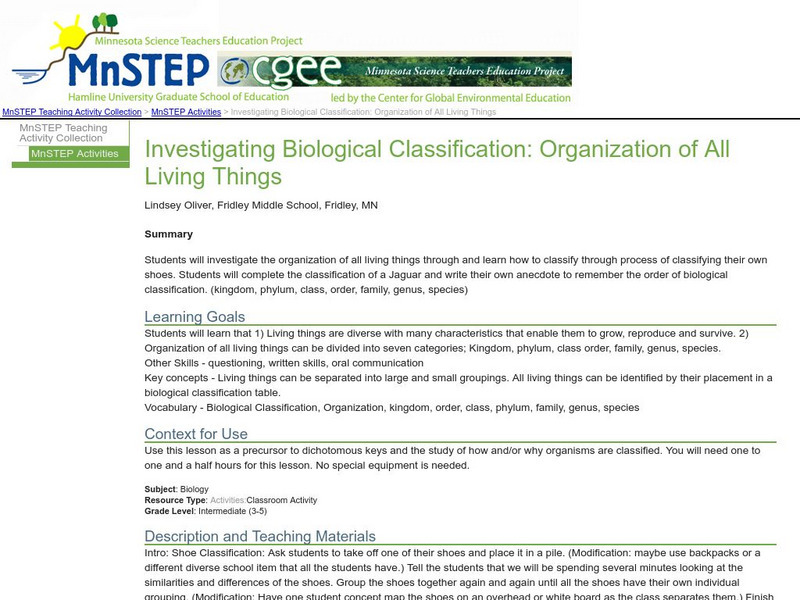Casimir Middle School
Biological Classification Worksheet
Classify living things with a set of worksheets that has pupils sorting and indentifying living and non-living things. Learners use the worksheets as a basis for finding their answers.
Virginia Department of Education
A Dichotomous Key of Virginia’s Native Plants
Can your class correctly classify plant species? Individuals explore native plants of the local environment and correctly classify them into their respective categories. They investigate differences in the plants and discuss similarities...
Virginia Department of Education
Animal Phyla and Plant Divisions
Searched hours for an activity that allows individuals the ability to use multiple resources to learn about both plant and animal kingdoms? This discussion and activity provide pupils with the ability to visualize each organism...
Curated OER
Classification Schemes
Junior biologists journey through the hiearchy of living things with these activites. Using a dichotomous key, they identify common algae, plants, and fish. They design their own key for a mixture of seeds and a collection of...
Curated OER
How Plants are Named
Genus and species are the 2 categories from which the plant classifications are derived and combined to create a scientific name. The rules for capitalization and underlining are given in these clean and logical slides.
Curated OER
What's Your Genus? Scientific Classification and the VT
Students learn about binomial nomenclature, the scientific system of classification. In this scientific classification lesson, students work cooperatively to complete a binomial scavenger hunt using the internet and a Visual Thesaurus....
Curated OER
Dichotomous Key
In this species worksheet, students use a dichotomous key to identify the 8 different species of "Norns," a fictitious animal group.
Curated OER
Organizing Life
In this taxonomy worksheet, learners learn about Linnaeus' system for classifying living things. Students complete 2 fill in the blank and 2 short answer questions based on what they read.
Curated OER
What Is a Species?
Students are able to recognize that scientists use different definitions of species. They are able to assess the strengths and limitations of species definitions depending on their context. Students are able to use definitions of...
Curated OER
Pair the Plants: An Introduction to Scientific Names
Students examine why plants have both common and scientific names, then complete the activity by matching each common plant name with its scientific name. They finish by working in cooperative groups to create an ABC of Plants class book.
Curated OER
Sunken Lesson: Classifying Animals
This PowerPoint features vocabulary and key concepts related to animal classification. Information about levels of classification, traits common to vertebrates and invertebrates, and a description of metamorphosis are included. The text...
Curated OER
Biodiversity
In this biodiversity instructional activity, students sort and classify animals by their observable features using a dichotomous key. Students then respond to questions about complete and incomplete metamorphosis.
Curated OER
Classifying Critters
In this classifying critters worksheet, learners read a 1 page article on classifying living organisms and then answer 10 true or false, short answer, multiple choice or fill in the blank questions.
Curated OER
ARE WE IN THE MIDDLE OF A MASS EXTINCTION?
Students identify and interpret the following: What is mass extinction, and what are some theories for why it happens? How often do species become extinct? What is the normal rate of extinction? Why are some species endangered? What...
Curated OER
Everything in Its Place: Science Classification
Students investigate the system of classification for living things through the sixteen lessons of this unit. The five kingdoms of monerans, protists, fungi, plants, and animals form the basis of several experiments as the similarities...
Curated OER
Classification of Living Things
In this biology learning exercise, students identify and locate various vocabulary terms relating to the classification of living things. There are 28 biology terms located in the word search.
Curated OER
Classification
In this biology activity, students identify and locate various vocabulary terms related to the classification of living things. There are 32 biology terms located in the word search.
Estrella Mountain Community College
Estrella Mountain College: Classification
Discusses many aspects of information pertainingto organism classification. Provides links to other areas in biology as well.
University of California
Ucmp: Web Lift to Taxa
Alphabetical listing from the University of California of info on each of the animal phyla. Includes scientific and common names and photos. Characteristics of each group are explained in detail.
Science Education Resource Center at Carleton College
Serc: Investigating Biological Classification: Organization of All Living Things
All living things can be identified by their placement in a biological classification table. Young scholars will investigate the organization of all living things and learn how to classify through the process of classifying their own...
Talk Origins Archive
Talk Origins: The Hominid Species
Talk Origins gives a broad description of the types of Hominid species, and then gives a description of each species. Includes the specific characteristics of each, and explains the differences between the species.
Wikimedia
Wikipedia: Binomial Nomenclature
Wikipedia, an open-source encyclopedia, offers great information on the classification system used in Biology. Covers the benefits of the system, history, and general information on the whole system together.
Sophia Learning
Sophia: Classification of Organisms: Lesson 1
This lesson will introduce taxonomy and give an example by providing the scientific classification of an organism. It is 1 of 2 in the series titled "Classification of Organisms."
Ducksters
Ducksters: Biology for Kids: Scientific Classification
Kid's learn about Biological and Scientific Classification. Kingdoms, phylums, genus, species, and more.



